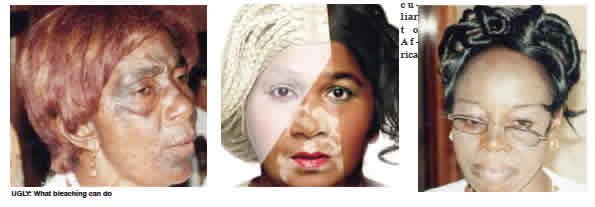
People go to great extent to look beautiful. They go as far as applying creams either locally or internationally made that can bleach their skin.
It is amusing that people who are dark want to get lighter, those who are light want to get whiter and those who are white want to get tanned (darker).
But, what is unknown to many is that, although such creams work but it might contain some harmful chemicals because the lightening creams use is quite cheap and produces fast result. These creams lighten the skin which glows for awhile and the end results are unimaginable
Reports on websites like sciencedirect.com, southwark.gov.uk, dermnetnz.org shows that these creams use in lightening contains active ingredients like hydroquinone and mercury which can cause immediate lightening but dangerous.
Mercury and hydroquinone could cause peeling skin, uneven skin tone, blotchiness, sun burnt skin, thickened skin. Large pores, itchiness, redness, dark patches, lines, wrinkles etc.
Creams that contain mercury and hydroquinone to lighten the skin weaken the immune system and can cause irreversible damage to the skin. It penetrates the skin and can cause permanent damage to the brain, kidney and liver.
Mercury is toxic and can also affect the life of an unborn child, if pregnant mothers should use it.
Hydroquinone may cause cataracts, plastic anaemia and bladder cancer. Hydroquinone is a powerful chemical used in photo processing, rubber manufacturing and acts as an active agent in hair dyes.
Mercury applied to the skin will react with the UV rays of the skin and re-oxidise, leading to darker and premature ageing when you continue to bleach the affected area.
Countries like London, Australia, Malaysia has banned the sale of cosmetics containing mercury and hydroquinone as an over-the-counter (without prescription) ingredients. The European Union had prohibited the sale of such products and in January 2003, they forbade the export of the products.
In United States of America, creams containing 2%hydroquinone and less could be bought over-the-counter and creams that contain more than 2% are sold under-the-counter, only if it is recommended by the dermatologist.
In Nigeria, the sales of such products are not restricted, you could get it anywhere without restrictions. But, all the same, be careful of the creams or products you apply on your skin. You could also read product reviews online or the ingredients on the package.
•Source: The Nation
